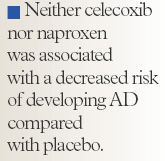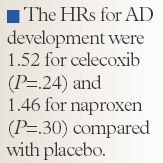- Safety & Recalls
- Regulatory Updates
- Drug Coverage
- COPD
- Cardiovascular
- Obstetrics-Gynecology & Women's Health
- Ophthalmology
- Clinical Pharmacology
- Pediatrics
- Urology
- Pharmacy
- Idiopathic Pulmonary Fibrosis
- Diabetes and Endocrinology
- Allergy, Immunology, and ENT
- Musculoskeletal/Rheumatology
- Respiratory
- Psychiatry and Behavioral Health
- Dermatology
- Oncology
ADAPT: Naproxen and celecoxib demonstrated to be ineffective in primary prevention of AD
Use of naproxen or celecoxib does not prevent Alzheimer's disease (AD), at least within the early years after treatment initiation, according to a randomized, placebo-controlled, multicenter study.

Key Points
Use of naproxen or celecoxib does not prevent Alzheimer's disease (AD), at least within the early years after treatment initiation, according to a randomized, placebo-controlled, multicenter study published in the journal Neurology.
The purpose of the AD Anti-inflammatory Prevention Trial (ADAPT) was to investigate whether AD could be prevented or delayed with the use of celecoxib or naproxen. Existing epidemiologic evidence indicates that use of nonsteroidal anti-inflammatory drugs (NSAIDs) for ≥2 years is associated with a reduced incidence of AD. Although the causes of AD are not well understood, neuropathologic evidence suggests the involvement of inflammatory processes.

The authors stated that primary analyses demonstrated an inconclusive trend towards increased AD incidence with either NSAID treatment. In secondary analyses (excluding the 7 patients with dementia at baseline), the HRs for AD development were 1.52 for celecoxib (P=.24) and 1.46 for naproxen (P=.30) compared with placebo.

The authors stated that because previous observational data suggest that NSAIDs may have protective effects for individuals whose onset of AD would be farther in the future than that measured in ADAPT, continued follow-up of the ADAPT cohort is warranted. The current data suggest that celecoxib and naproxen are not indicated for AD prevention but, according to the authors, the data are too limited to be considered evidence that those at risk for AD should avoid these or other NSAIDs.
SOURCE
Lyketsos CG, Breitner JCS, Green RC, et al; for the ADAPT Research Group. Naproxen and celecoxib do not prevent AD in early results from a randomized controlled trial. Neurology. 2007;68:1800–1808.
Employers Face Barriers With Adopting Biosimilars
March 1st 2022Despite the promise of savings billions of dollars in the United States, adoption of biosimilars has been slow. A roundtable discussion among employers highlighted some of the barriers, including formulary design and drug pricing and rebates.
